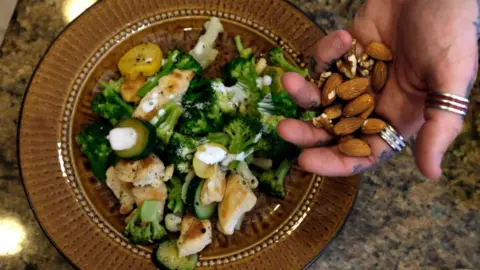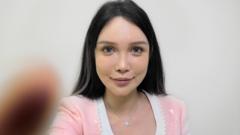In recent times, numerous social media influencers have come under fire for offering questionable cures for polycystic ovary syndrome (PCOS), a hormonal disorder affecting an estimated 10% of women globally. Among them is Kourtney Simmang, who markets unproven tests and supplements to those suffering from this condition. Sophie, a woman dealing with painful periods, weight gain, and depression as a result of PCOS, turned to influencers like Kourtney after struggling to obtain effective medical assistance.
Kourtney claimed she could address the “root cause” of PCOS and sold a combination of lab tests, health protocols, and coaching for a hefty price of approximately $3,600 (£2,800). In hopes of alleviating her symptoms, Sophie paid extra for the required supplements via Kourtney’s affiliate links. However, after nearly a year without relief, Sophie abandoned the program, reflecting on the negative impact it had on her relationship with food and her body.
Dr. Jen Gunter, a gynecologist and women’s health educator, voiced strong criticisms against Kourtney’s claims, categorizing her as unqualified to conduct the sold tests, which possess limited medical utility. Furthermore, many unqualified influencers, often boasting over a million followers, capitalize on the void in reliable medical explanations for PCOS by presenting themselves as health gurus.
A study from the BBC World Service highlighted that around half of the videos tagged with “PCOS” on social media platforms like TikTok and Instagram disseminated misleading information. Many of these influencers, who advertise supplement strategies, assert that dietary changes, like adopting a keto diet, can cure PCOS. However, the reality is that there is no established cure for this condition, nor is there evidence that restrictive diets significantly improve symptoms.
Awareness of PCOS remains low, with the World Health Organization estimating that up to 70% of affected women have not received a diagnosis. Misinformation proliferates in the absence of straightforward medical solutions, often leaving vulnerable women with feelings of desperation.
Experts caution that claims put forth by influencers could lead to patients avoiding essential medical consultations, potentially worsening their health and creating additional challenges, including the risk of diabetes. The influencer Tallene Hacatoryan, a registered dietitian with millions of followers, has also recommended her own line of supplements and lifestyle adjustments, such as eliminating gluten and dairy, despite a lack of scientific backing.
While some influencers can promote healthy lifestyle changes, their claims can also unintentionally contribute to eating disorders and body image issues, as highlighted by individuals like Amy from Northern Ireland. As women seek help through social media, they’re often exposed to unverified remedies rather than evidence-based information.
On a positive note, individuals like Medlyn, a medical student from Nigeria, are advocating for open discussions about PCOS. By encouraging women to consult professionals rather than relying on influencer-driven advice, Medlyn aims to dismantle the stigma surrounding this condition and promote informed treatment options.
Medical professionals, like Dr. Gunter, suggest that women struggling to find adequate support should consider visiting specialists with expertise in endocrinology or obstetrics and gynecology to receive proper guidance on managing PCOS. While Sophie continues to search for effective treatments, many women find themselves facing an uphill battle against misinformation in their quest for health.





















